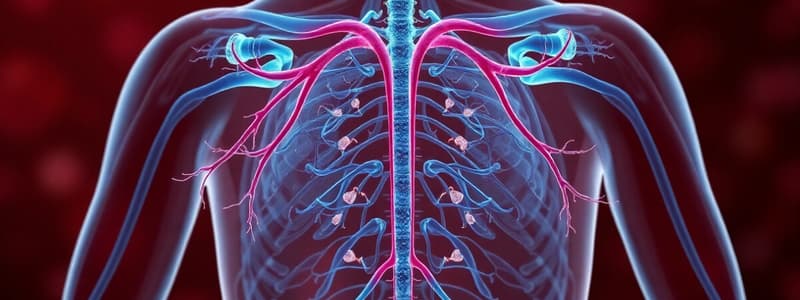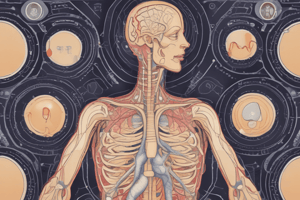Podcast
Questions and Answers
What is the primary role of the endocrine system?
What is the primary role of the endocrine system?
- Regulating blood pressure
- Maintaining homeostasis (correct)
- Facilitating digestion
- Enhancing immune response
Which of the following is NOT a function of hormones secreted by the endocrine glands?
Which of the following is NOT a function of hormones secreted by the endocrine glands?
- Controlling body temperature
- Stimulating muscle contraction
- Manufacturing blood cells (correct)
- Regulating metabolism
Which glands are involved in the secretion of adrenal hormones?
Which glands are involved in the secretion of adrenal hormones?
- Pituitary glands
- Adrenal glands (correct)
- Thyroid glands
- Pancreas
Which of these hormones is primarily responsible for regulating blood sugar levels?
Which of these hormones is primarily responsible for regulating blood sugar levels?
How does the endocrine system primarily communicate with the body?
How does the endocrine system primarily communicate with the body?
What is the primary role of the endocrine system in the body?
What is the primary role of the endocrine system in the body?
What type of glands does the endocrine system comprise?
What type of glands does the endocrine system comprise?
Which of the following hormones can lead to hyperthyroidism when produced in excess?
Which of the following hormones can lead to hyperthyroidism when produced in excess?
Which hormone-related disorder is characterized by low blood sugar levels?
Which hormone-related disorder is characterized by low blood sugar levels?
Which of the following processes is influenced by hormones in the endocrine system?
Which of the following processes is influenced by hormones in the endocrine system?
What role does Growth Hormone (GH) primarily serve in adults?
What role does Growth Hormone (GH) primarily serve in adults?
Which hormone is responsible for stimulating the thyroid gland's growth and activity?
Which hormone is responsible for stimulating the thyroid gland's growth and activity?
What type of feedback mechanism do the hypothalamus and pituitary gland operate under?
What type of feedback mechanism do the hypothalamus and pituitary gland operate under?
Which hormone is primarily involved in stimulating milk production after childbirth?
Which hormone is primarily involved in stimulating milk production after childbirth?
In terms of hormone secretion, which gland is associated with antidiuretic hormone?
In terms of hormone secretion, which gland is associated with antidiuretic hormone?
What type of tissue does Growth Hormone influence for growth in children?
What type of tissue does Growth Hormone influence for growth in children?
Which hormone stimulates the output of steroid hormones, especially cortisol, from the adrenal cortex?
Which hormone stimulates the output of steroid hormones, especially cortisol, from the adrenal cortex?
Which of the following hormones is NOT secreted by the pituitary gland?
Which of the following hormones is NOT secreted by the pituitary gland?
What role does cortisol play in the body?
What role does cortisol play in the body?
What hormone does the anterior pituitary release in response to stress to stimulate cortisol production?
What hormone does the anterior pituitary release in response to stress to stimulate cortisol production?
Which of the following is NOT a function of glucocorticoids?
Which of the following is NOT a function of glucocorticoids?
What is the primary function of aldosterone?
What is the primary function of aldosterone?
What effect does adrenaline NOT have on the body during the 'fight or flight' response?
What effect does adrenaline NOT have on the body during the 'fight or flight' response?
How does noradrenaline help maintain blood pressure?
How does noradrenaline help maintain blood pressure?
What is an unwanted side effect of administering glucocorticoid medications like cortisone?
What is an unwanted side effect of administering glucocorticoid medications like cortisone?
Which situation would likely trigger the secretion of aldosterone?
Which situation would likely trigger the secretion of aldosterone?
What is the primary function of insulin in the body?
What is the primary function of insulin in the body?
Which hormone is secreted by the pancreatic islets to increase blood glucose levels?
Which hormone is secreted by the pancreatic islets to increase blood glucose levels?
What role does somatostatin play in the regulation of insulin and glucagon?
What role does somatostatin play in the regulation of insulin and glucagon?
What hormones are secreted by the ovaries and are responsible for regulating the menstrual cycle?
What hormones are secreted by the ovaries and are responsible for regulating the menstrual cycle?
What is the primary function of the hormone thymosin?
What is the primary function of the hormone thymosin?
How does melatonin affect the body?
How does melatonin affect the body?
What effect does glucagon have on glycogen in the liver?
What effect does glucagon have on glycogen in the liver?
What primarily suppresses the secretion of melatonin?
What primarily suppresses the secretion of melatonin?
Flashcards are hidden until you start studying
Study Notes
Endocrine System
- The endocrine system plays a crucial role in maintaining homeostasis, the balance of the body's internal environment.
- It works in conjunction with the autonomic nervous system (ANS), which manages rapid changes, while the endocrine system focuses on slower adjustments.
- The endocrine system comprises ductless glands that secrete hormones directly into the bloodstream. These hormones act as chemical messengers.
Endocrine Glands
- Major glands of the endocrine system include:
- Pituitary gland
- Adrenal glands (2)
- Pancreatic islets
- Pineal gland
- Thyroid gland
- Thymus
- Parathyroid glands (4)
- Ovaries (2)
- Testes (2)
Hormone Functions
- Hormones influence a wide range of bodily processes:
- Growth and development
- Stress response
- Nutrition
- Reproduction
Disorders of the Endocrine System
- Endocrine disorders arise from either an excess (hyper) or deficiency (hypo) of a particular hormone.
- Examples include:
- Hypoglycemia (low blood sugar)
- Hyperthyroidism (excessive thyroxine)
Why Study the Endocrine System?
- Understanding the endocrine system is vital in dentistry due to:
- Oral clinical presentations of endocrine diseases
- Medical emergencies related to hormone imbalances
- Behavioral aspects associated with endocrine disorders
Pituitary Gland
- Located in the hypophyseal fossa of the sphenoid bone, below the hypothalamus.
- Connected to the hypothalamus by a stalk.
- Works in tandem with the hypothalamus through a negative feedback regulation system.
Hypothalamus Hormones
- The hypothalamus releases several hormones:
- Growth hormone releasing hormone (GHRH)
- Growth hormone release inhibiting hormone (GHIH)
- Thyrotrophin releasing hormone (TRH)
- Corticotrophin releasing hormone (CRH)
- Prolactin releasing hormone (PRH)
- Prolactin inhibiting hormone (PIH) (Dopamine)
- Luteinising releasing hormone (LHRH)
- Gonadotrophin releasing hormone (GnRH)
Pituitary Gland Hormones: Anterior Pituitary
- The anterior pituitary secretes the following hormones:
- Growth hormone (GH)
- Prolactin
- Thyroid stimulating hormone (TSH)
- Adrenocorticotrophic hormone (ACTH)
- Gonadotrophins
Pituitary Gland Hormones: Posterior Pituitary
- The posterior pituitary secretes:
- Oxytocin
- Antidiuretic hormone (ADH)
Functions of Growth Hormone (GH)
- GH is responsible for growth in children and maintenance and repair in adults.
- It promotes growth of:
- Skeleton
- Muscles
- Connective tissue
- Kidneys
- Liver
- Intestines
- Pancreas
- Adrenal glands
Other Pituitary Gland Hormones
- Thyroid stimulating hormone (TSH):
- Stimulates growth and activity of the thyroid gland.
- Adrenocorticotrophic hormone (ACTH)
- Stimulates the adrenal cortex and increases the production of steroid hormones, particularly cortisol.
- Prolactin:
- Stimulates lactation (milk production) after childbirth.
Cortisol
- Key role in glucose metabolism and is released in response to stress (shock, pain).
- Hypothalamus triggers the anterior pituitary to release ACTH, causing the adrenal cortex to release glucocorticoids.
Glucocorticoids
- Combat stress by:
- Increasing blood sugar by promoting the formation of new sugar.
- Converting amino acids to glucose in the liver.
- Promoting lipolysis (breakdown of fats for energy production).
- Breaking down proteins into amino acids.
- Promoting sodium and water reabsorption from renal tubules.
Therapeutic Applications of Glucocorticoids
- Glucocorticoids have anti-inflammatory properties and can suppress the immune system and the response to injury.
- Used as medications like cortisone to treat conditions like inflammation and autoimmune disorders.
Aldosterone
- Mineralocorticoid involved in the regulation of electrolyte balance, particularly sodium and potassium levels.
- Stimulates reabsorption of sodium and water, while increasing the excretion of potassium.
- Released when there are low blood sodium levels or high blood potassium levels.
Adrenal Medulla
- Secretes two hormones involved in the fight-or-flight response:
- Adrenaline (epinephrine)
- Noradrenaline (norepinephrine)
Adrenaline
- Triggers the fight-or-flight response.
Effects of Adrenaline
- Increases metabolic rate.
- Increases heart rate and blood pressure.
- Dilates blood vessels of muscles, heart, and brain.
- Dilates pupils.
- Dilates bronchioles.
- Converts glycogen to glucose.
- Constricts blood vessels in the skin.
Function of Noradrenaline
- Primarily involved in maintenance of blood pressure through vasoconstriction (except in coronary arteries).
Pancreatic Islets
- Clusters of cells within the pancreas that produce hormones involved in regulating blood glucose levels:
- Insulin
- Glucagon
- Somatostatin
Function of Insulin
- Reduces blood glucose levels by:
- Stimulating the uptake and use of glucose by muscle and connective tissue cells.
- Promoting the storage of glucose by increasing the conversion of glucose to glycogen.
Function of Glucagon
- Increases blood glucose levels by:
- Converting glycogen to glucose.
- Gluconeogenesis (formation of new sugar from other sources).
- Released in response to low blood glucose levels.
Hormones Secreted by Ovaries and Testes
- Ovaries produce estrogen and progesterone.
- Testes produce testosterone.
Hormones Produced by Ovaries
- Estrogen and progesterone:
- Regulate the menstrual cycle.
- Bring about sexual maturity in females.
Role of Estrogen
- Involved in the development and regulation of the female reproductive system, including the menstrual cycle, pregnancy, and childbirth.
Testes
- Produce spermatozoa and testosterone.
- Testosterone, along with luteinising hormone (LH) from the anterior pituitary, brings about sexual maturity in males.
Regulation and Effects of Male Hormone
- Testosterone plays a crucial role in the development and maintenance of male sexual characteristics, including the growth of muscle mass, bone density, and secondary sexual characteristics.
Thymus Gland
- Located in the chest behind the sternum.
- Secretes the hormone thymosin.
Thymosin
- Essential for the development of T-lymphocytes for cell-mediated immunity.
- Responsible for the growth and maturation of the thymus and other lymph tissue.
- Production declines with age.
Pineal Gland
- Small gland located in the brain.
- Produces the hormone melatonin.
Melatonin - Function
- Helps regulate circadian rhythms (24-hour cycles), possibly influencing the hypothalamus.
Studying That Suits You
Use AI to generate personalized quizzes and flashcards to suit your learning preferences.




